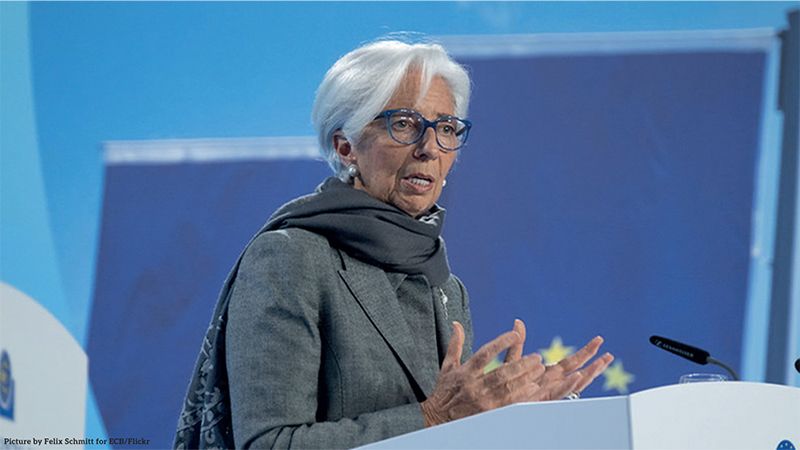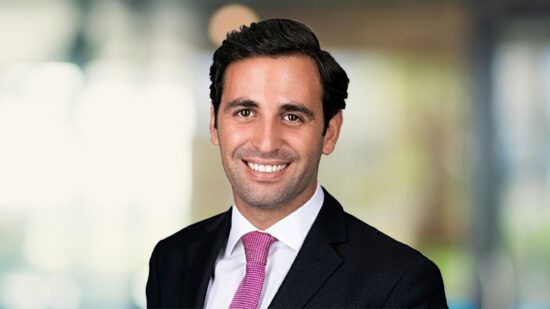The European Central Bank (ECB) elected to keep key rates unchanged on Thursday, 7 March, while inflation projections continue to decrease.
ECB staff now predict inflation to average 2.3% in 2024, 2% in 2025, and 1.9% in 2026.
The key rates continue at 4.5%, 4.75%, and 4% for main refinancing operations, marginal lending facility, and the deposit facility, respectively. These rates have been in place since September 2023.
See also: Crisis valuations – without the crisis
Anna Stupnytska, global macro economist at Fidelity International, said: “The downgrade to both growth and inflation forecasts for 2024-25 came across as a dovish signal, and in her press conference President [Christine] Lagarde cautioned that risks to growth are still tilted to the downside.
“At the same time, Lagarde emphasised that while progress on inflation has been made, more is required for the Governing Council to be sufficiently confident inflation is heading back to target.”
She added: “Since early 2024, we are seeing some tentative signs of green shoots in euro area activity, as witnessed by modest improvements in the PMIs, especially in services across the board. Consumers are getting more optimistic on lower inflation and higher growth in real disposable incomes as of late. While this improvement is encouraging, we agree with Lagarde’s comments that risks to growth are skewed to the downside, as tight policy continues to transmit into the real economy and the external sources of growth, including China’s economy, remain weak.”
See also: Will inflation fall enough for ‘year of the bond’?
The growth projection for 2024 was taken down to 0.6% but sits at 1.5% for 2025 and 1.6% in 2026.
Seema Shah, chief global strategist at Principal Asset Management, estimated based on the forecasts that the first rate cuts would take place near mid-year.
“On their own, the downward revisions to both growth and inflation forecasts make a decent case for near-term policy rate cuts, while disappointing industrial production data from Germany only serves to emphasise the need for rate cuts,” Shah said.
“But the ECB is leaning into its hawkish nature, waiting for further evidence of fading price pressures, particularly from the wage side, before introducing monetary relief. It is possible that the Fed’s caution with regards to their own rate cutting cycle is also stalling the ECB’s debate a little. But, with euro area economic growth now expected to be just 0.6% and inflation set to undershoot the 2% target by 2026, once the ECB starts cutting, it will cut with some urgency.”
On Wednesday, Federal Reserve Chair Jerome Powell said rates would not be cut until there was “greater confidence” inflation was moving “sustainably” towards its 2% goal.
Lindsay James, investment strategist at Quilter Investors, said: “The ECB has matched the Federal Reserve’s resolve to maintain a data dependent approach, continuing to emphasise a message of patience despite recent comments from Christine Lagarde that rate cuts ahead of the summer months may be likely.”
Ann-Katrin Petersen, chief investment strategist for Germany, Austria, Switzerland and Eastern Europe at the BlackRock Investment Institute, added that while she believes the ECB will cut rates this year, it is “not a case of the early bird catching the worm”.
“The bank is waiting patiently for more evidence on its criteria for the inflation outlook, above all that wage growth is slowing, before it can consider its inflation fight finished,” Petersen said.
“The ECB’s updated macro projections showed downward revisions to near-term economic growth and particularly inflation – with core inflation settling close to target in 2025. As the energy shock unwinds and past ECB rate hikes bite more than the Fed’s are biting in the US, we expect headline inflation to fall to – or even temporarily undershoot – the ECB’s 2% inflation target in 2024.”







